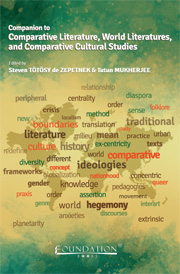Book contents
- Frontmatter
- Contents
- Introduction to the Companion to Comparative Literature, World Literatures, and Comparative Cultural Studies
- PART 1 Theories of Comparative Literature, World Literatures, and Comparative Cultural Studies
- The Contextual Study of Literature and Culture, Globalization, and Digital Humanities
- Comparative Literature and Ex-centricity
- Possibilities and Limits of Comparative Literature Today
- Comparative Cultural Studies and Pedagogy
- Teaching World Literatures
- Comparative Literature and the History of Literature
- Meltzl de Lomnitz, Comparative Literature, and Philosophy
- Comparative Cultural Studies and Cultural Anthropology
- Comparative Literature and Interart Studies
- Gender and Genre in Comparative Literature and (Comparative) Cultural Studies
- Comparative Cultural Studies and Translation Studies
- Comparative Cultural Studies and the Study of Medieval Literature
- Comparative Cultural Studies and Linguistic Hybridities in Literature
- Comparison and Postcoloniality
- (Inter)mediality and the Study of Literature
- PART 2 Comparative Literature in World Languages
- PART 3 Examples of New Work in Comparative Literature, World Literatures, and Comparative Cultural Studies
- PART 4 Multilingual Bibliography of Books in Comparative Literature, World Literatures, and Comparative Cultural Studies
- Index
The Contextual Study of Literature and Culture, Globalization, and Digital Humanities
from PART 1 - Theories of Comparative Literature, World Literatures, and Comparative Cultural Studies
Published online by Cambridge University Press: 05 April 2014
- Frontmatter
- Contents
- Introduction to the Companion to Comparative Literature, World Literatures, and Comparative Cultural Studies
- PART 1 Theories of Comparative Literature, World Literatures, and Comparative Cultural Studies
- The Contextual Study of Literature and Culture, Globalization, and Digital Humanities
- Comparative Literature and Ex-centricity
- Possibilities and Limits of Comparative Literature Today
- Comparative Cultural Studies and Pedagogy
- Teaching World Literatures
- Comparative Literature and the History of Literature
- Meltzl de Lomnitz, Comparative Literature, and Philosophy
- Comparative Cultural Studies and Cultural Anthropology
- Comparative Literature and Interart Studies
- Gender and Genre in Comparative Literature and (Comparative) Cultural Studies
- Comparative Cultural Studies and Translation Studies
- Comparative Cultural Studies and the Study of Medieval Literature
- Comparative Cultural Studies and Linguistic Hybridities in Literature
- Comparison and Postcoloniality
- (Inter)mediality and the Study of Literature
- PART 2 Comparative Literature in World Languages
- PART 3 Examples of New Work in Comparative Literature, World Literatures, and Comparative Cultural Studies
- PART 4 Multilingual Bibliography of Books in Comparative Literature, World Literatures, and Comparative Cultural Studies
- Index
Summary
Abstract: In their article “The Contextual Study of Literature and Culture. Globalization, and Digital Humanities” Steven Tötösy de Zepetnek and Louise O. Vasvári discuss the situation of the humanities with regard to the discipline of comparative literature and the fields of world literature, cultural studies, and comparative cultural studies. Their postulate is that in order to make the study of literature and culture a socially, politically, and economically relevant activity of scholarship today, humanities scholars ought to turn to contextual and evidence-based work. Further, they argue that comparative cultural studies—an approach that is inter- and multi-disciplinary and employs new media technology—would achieve global presence and social relevance for the humanities with in-depth scholarship.
Introduction
The perspective of comparison in scholarship has been (and continues to be) widely employed in various disciplines. Among several compelling lines of argumentation put forward of recent are, for example, by Marcel Detienne in his Comparing the Incomparable, George M. Fredrickson in his The Comparative Imagination, or as Richard A. Peterson states, “comparison is one of the most powerful tools used in intellectual inquiry, since an observation made repeatedly is given more credence than is a single observation” (257). At the same time, in and about the discipline of comparative literature it remains a recurrent view that it is lacking definition, has no or only a partial framework of theory and/or methodology, and that for these reasons the discipline remains with a history and presence of insecurity (see, e.g., Grabovszki).
- Type
- Chapter
- Information
- Companion to Comparative Literature, World Literatures, and Comparative Cultural Studies , pp. 3 - 35Publisher: Foundation BooksPrint publication year: 2014



